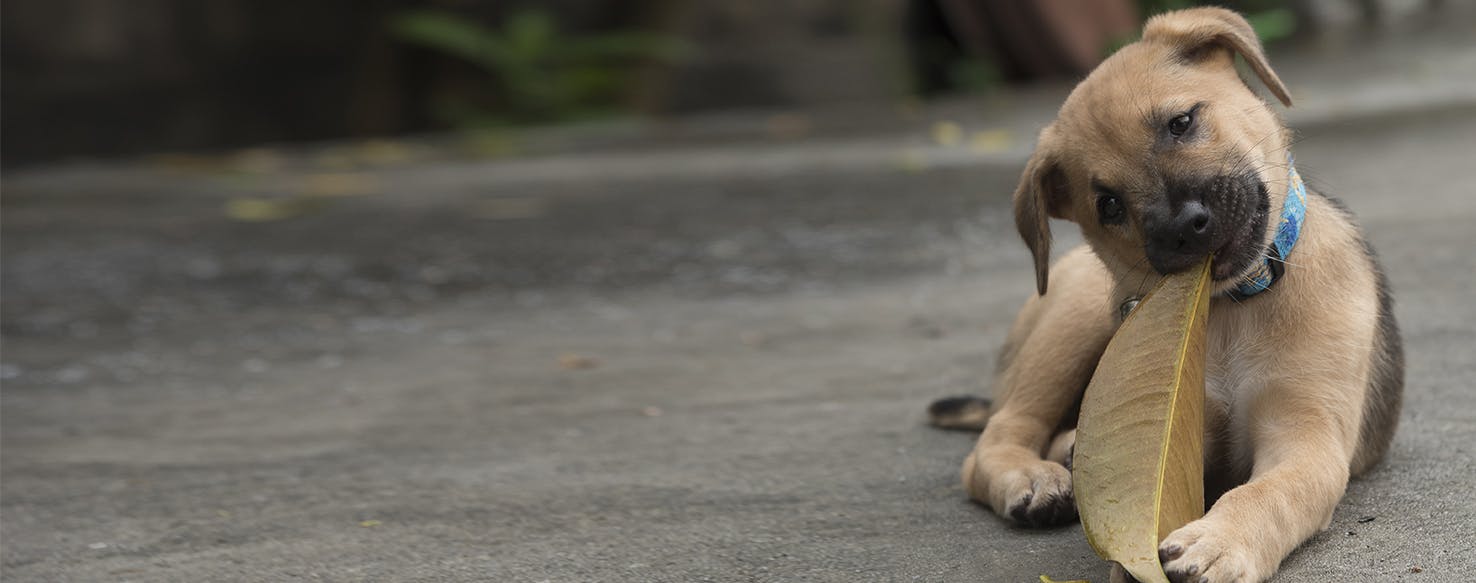- Home
- The Daily Wag!
- Behavior
- Why Does My Dog Bite His Nails

Common
Irregular
Just like humans, dogs have their own set of quirks and habits that vary from sometimes seeming odd to their pet-parents while other times are seen as completely relatable. One commonly shared behavior by both dogs and their owners is nail-biting. In humans, it is usually associated with anxiety or stress, boredom, and most recently an individual’s personality. Certain studies even linked the stress-relieving habit to a specific personality trait, proposing that nail biters are more likely to be perfectionists. While all of the above may make sense in regards to humans, why do dogs bite nails and should you let them do it?
As it turns out, the behavior is relatively common. There are several reasons a dog might bite his nails, ranging from harmless to somewhat concerning. Starting with the former, it is natural for dogs to groom themselves by licking their own paws and occasionally nibbling on their nails. It is also possible your pooch’s nails have gotten too long and it is uncomfortable, possibly even painful, for him to walk. This is even more likely if your dog spends more of his time indoors or on the grass in the backyard and not on the pavement during longer walks where his nails can get filed on their own. If that is the case, your canine buddy might be trying to make himself more comfortable by attempting to make them shorter. Making sure a dog’s nails are of the correct, comfortable, and healthy length is every owner's responsibility. When neglected, a dog’s nails can get so long they start to curve in and hurt his paws. If your dog is biting his nails frequently, inspect their length and if needed trim his nails or take him to a groomer or a veterinarian to ensure they are trimmed properly. See if getting them clipped makes a difference in your furball’s behavior.
If your dog still bites his nails, the behavior might be compulsive and not caused by physical discomfort or pain. Like humans, dogs can exhibit compulsive behavior or impulses due to a variety of reasons, most commonly related to anxiety. If your dog’s nails have been trimmed and he continues to nibble or chew on his nails, consult a veterinarian to help determine what could be behind the behavior and to rule out any medical reasons. Note if your canine buddy bites his nails at any particular times, for example, when you bring out the vacuum or when you come back home from work. This will also help determine if his habit is related to noise or separation anxiety.
Need advice about your pet's health?
Get answers fast from a veterinary professional 24/7 in the Wag! App.
Get Vet ChatWhether you should allow for the behavior to happen or prevent it from occurring will largely depend on the reason behind it. If it is linked to anxiety, it is incredibly important to address the underlying issue at hand and not discourage the behavior until the cause has been dealt with. Dogs have different ways of self-soothing, from chewing on furniture to nail-biting and toy licking. Discouraging such behavior without solving the underlying issue will simply confuse your dog, as well as make him even more anxious. Instead, focus on reducing whatever it is that is stressing him out if that is possible or familiarizing him with whatever brings him the anxiety.
Do not be afraid to consult a professional dog trainer or animal behaviorist for guidance and support. Some dogs bite their nails playfully, out of sheer boredom and as a way to pass the time. As long as it is not obsessive and your dog’s veterinarian knows about it, there is no harm in occasional indulgence in the behavior. If you find the behavior annoying or concerning, try to distract your pooch from doing it. Take him for a walk or initiate a game of tag - both of these are great alternatives to the nail nibbling.
Lastly, many dogs bite their nails due to itchiness caused by allergies. A dog’s paws are exposed to a lot of different elements and substances when they are out on their daily walks around the neighborhood. Some dogs have allergies to pollen, certain plants, or other outdoor elements that they might encounter, step on, and get on their paws or between their nails. Consequently, many of them try to get rid of those things when they get back home. To save your dog the trouble (and to save yourself the hassle of cleaning the floor), wipe your canine’s paws after each walk. Not only should this reduce his nail-biting behavior but also prevent him from ingesting something that could be harmful to him such as antifreeze or salt that can be found on most roads during the winter time.
As with most canine behavior, there aren’t any ways we can ask our four-legged family members why they act a certain way or do what they do. However, based on their history, given context and other behavior or symptoms, we can try to figure our pooches out. Whether the nail-biting is caused by boredom, allergies, or lack of proper grooming, it is up to the dog owners to help their canine companions healthy and maintain their wellbeing.
Written by a Shikokus lover Maria Pawluczuk
Veterinary reviewed by:
Published: 03/29/2018, edited: 01/30/2020
More articles by Maria Pawluczuk

